外研版英语八上Module 5 Unit 3
外研版八年级英语上册课件M3-U3 Language in use

常用比较级一些不规则变化:
原级
比较级
good
better
bad
worse
little
less
many/much
more
far
farther/further
Are you familiar with these sentences? They are all from the texts we have learnt.
now.
loudly
6. They cheer useaornli_e_r______ (loud).
7. It gets dark ________ (early).
副词的基本用法
一般说来,副词主要用来修饰动词、形 容词和副词。例如:
She plays the piano badly. 她钢琴弹得很糟。
3. It’s safer than playing tennis. 4. That means we have a better chance of winning. 5. Nothing is more enjoyable than playing tennis. 6. They cheer us on loudly and we feel more confident to win the game. 7. Staying at home was easier than going to the stadium.
basketball tennis volleyball table tennis
bowling
football basketball tennis volleyball table tennis baseball bowling snooker
外研版英语八年级上册Module 5 全部课件
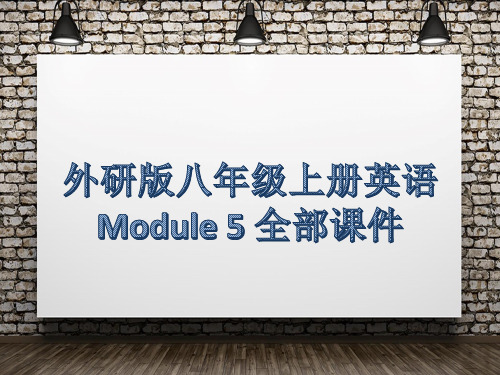
audience
Lao She Teahouse
Have you ever been to Lao She Teahouse? What can people do in Lao She Teahouse?
Lao She’s Teahouse nowadays
Inside of Lao She Teahouse
Lingling (1) _o_ff_e_r_e_d_ to take Betty to Lao She Teahouse. The words of the opera were (2) _d_if_f_ic_u_l_t to understand, but the actors
and (3) _a_c_t_r_e_ss_e_swere excellent. They only planned to watch for an hour, but in the (4)__e_n_d___, they stayed for three hours.
Module 5 Lao She Teahouse
Unit 1 I wanted to see the Beijing Opera.
老舍(1899年2月3日—196N 6年o8月24 日),男W,ho原is名he舒?庆春,Im 字舍a予g,e另有 笔名絜青W、ha鸿t d来o y、ou非k我no等w。ab因ou为t h老im舍?生 于阴历立春,父母为他取名“庆春”, 大概含L有ao庆S贺he春(18来99、-19前66景) w美as好on之e o意f t。he上 学后,m自o己st r更en名ow为ne舒d (舍著名予的,)含有“舍弃 自我”c,on亦tem即p“ora忘ry我(当”代的的意) C思hi。ne北se 京满 族正红w旗ri人ter。s, f[a1m] ou中s f国or现his代no小ve说ls 家and、作
外研版英语八年级上Module3知识点及英语学习方法

外研版英语八年级上Module3知识点及英语学习方法0 1Module 3单词1、baseball ['beisbɔ:l] n. 棒球2、volleyball ['vɔlibɔ:l] n. 排球3、boring ['bɔ:riŋ] adj. 无聊的;烦人的4、exciting [ik'saitiŋ] adj.使人兴奋的;令人激动的5、relaxing [ri'læksiŋ] adj. 令人愉悦的;使人轻松的6、score [skɔ:] vi.(体育比赛中)得分;记分7、already [ɔ:l'redi] adv. 已经,早已8、matter ['mætə] n.问题;麻烦9、What`s the matter 怎么了?10、hurt [hə:t] vt. 使受伤;使疼痛11、enjoyable [in'dʒɔiəbl] adj. 有乐趣的;令人愉快的12、Olympics [əu'limpiks] n. 奥林匹克运动会13、stadium ['steidiəm] n. 体育场14、miss [mis] v. 未击中;未达到15、mind [maind] v. vt. 介意,讨厌;反对16、plenty ['plenti] pron.大量;众多17、plenty of 大量;众多18、beat [bi:t] vi. 战胜;打败19、careless ['kεəlis] adj. 粗心的;疏忽的20、cheer…on用欢呼声激励;为….加油21、coach [kəutʃ] n. 教练22、fan club球迷(或影迷、歌迷)俱乐部23、against [ə'ɡenst] prep. (在比赛或战斗中)对(某人或某事物)24、train [trein] v. (体育)训练;操练25、practice ['præktis] n. 练习26、warm [wɔ:m] vt. 使暖和;使…温暖27、warm up 热身;做准备活动28、usual ['ju:ʒuəl] adj. 通常的,平常的29、better [betə] adv. 更好地;adj. 更好的30、after-school ['æftəskʊl] adj. 下午放学后的,课外的31、pleased [pli:zd] adj. 开心的;满足的32、pass [pɑ:s, pæs] vi. 传送;传递33、pity ['piti] n.可惜;遗憾34、chance [tʃɑ:ns] n. 机会,可能性35、loudly ['laudli] adv. 大声地,响亮地36、confident ['kɔnfidənt] adj. 自信的0 2Module3课文视频Module 3 Unit 1Module 3 Unit 20 3Module3知识梳理【重点短语】1. sit down 坐下2. stay at home 待在家里3. bad luck 坏运气4. watch TV 看电视5. lose matches 输掉比赛6. next time 下一次7. be good at 擅长8. play against 对抗9. warm up 热身;做准备活动10. be late for 迟到11. cheer on 用欢呼声激励;为……加油12. keep fit 保持健康13. get lost 迷路14. a minute ago 一分钟之前15. plenty of 许多16. be ready for 为……做好准备17. at weekends 在周末18. in the countryside 在乡村【重点句型】1. ---What’s the score? 比分是多少?---Spain scored a minute ago. 西班牙刚进一球。
英语外研版八年级上Module3

以上我们已经通过归纳总结和练习对
本课的语法内容有了一定的了解, 下
面就让我们根据之前练习的考察情况
进一步选择讲解该语法项的重难点。
形容词比较级Ⅱ 复习形容词比较级的规则变化
tall→taller long→longer 以字母e结尾的词,在 fine→finer late→later 单音节 词尾加-r 和部分 重读闭音节词且词尾 big→bigger 双音节 只有一个辅音字母, thin→thinner 双写辅音字母再加-er 词 以“辅音字母 + y”结 easy→easier 尾的双音节词,先把 friendly→friendl “y”改为“i”再加-er ier 一般在词尾加-er
另外,有许多副词是由形容词+ly构成 的,如:
careful (a.)+ ly quick (a.) + ly carefully quickly
safe (a.) + ly
3; ly
heavy (a.) + ly 注意:
busily
heavily
有些词既可作形容词也可作副词, 如fast, early, late等
3. We are training harder than usual. 4. This year we want to do better. 5. Nothing is more enjoyable than playing tennis. 6. This year we are training more carefully. 7. That means we have a better chance of winning.
3
Complete the sentences with the correct form of the words in brackets.
外研版八年级英语上册教案 Moddule 5 Unit 3-2

Module 5 Lao She TeahouseUnit 3 Language in use 2一、教学目标1. 熟练掌握下列词汇和短语:audience, survive, take place等。
2. 掌握本模块的重点句型。
3. 能够了解西方剧院的起源,读懂介绍古希腊剧院概况的文章。
4. 能够选一部戏剧中的一幕改编成短剧并表演。
二、教学重点及难点重点:1. 掌握本单元的单词、短语、句型及语法。
2. 能够了解西方剧院的起源,读懂介绍古希腊剧院概况的文章。
难点:选一部戏剧中的一幕改编成短剧并表演。
三、教学准备1. 多媒体设备和课件;2. 设计课后巩固练习;3. 教学图片。
四、教学过程Step 1 RevisionPractise and review the grammar.【设计意图】通过练习检测学生对于本模块语法的掌握情况。
Step 2 Warming-up1. Look at the pictures and talk about them.2. Look at the picture and learn something about it.【设计意图】通过展示世界著名剧院的形式引入本课,拓宽学生的眼界,吸引学生的注意力,并拓展课外知识。
Step 3 PracticeAround the world1. Ask Ss to read the passage and answer the questions.2. T checks the answers with the whole class.【设计意图】帮助学生了解西方剧院的起源和古希腊剧院的概况,扩大知识面,加强跨文化交际的能力。
3. Let Ss do some exercises to consolidate what they have learned.(1) Choose the correct answer.(2) Complete the sentences with the correct form of the words. 【设计意图】通过练习巩固本课所学知识,考查学生对知识的掌握程度。
外研版英语八年级上册Module3单元知识点归纳总结(详细版)

=sb. be sure that+ 宾语从句Unit1 Nothing is moreenjoya ble thanplay ing tennis.1. boring/dull-interesting/excitingdan gerous-safedifficult/hard-easyexpensive/dear-cheap/ in expensivepopular- unpopular2. on TVon the radio/teleph one/lnternet3. What ' s the sc(ofethe baseball /tennis match)? n.Spa in score d a minute ago. v.4. not …at a根本没…一点儿也不…Not at all.不客气,没关系5. What ' s the matter /trouble/problem? What ' s wrong with …?6. look tiredfeel bored/excited/relaxedmake sb. in terested/surprised/relaxed7. hurt one ' s knee/leg/armhurt on eself vt.My knee hurt(s). 我的膝盖痛。
vi. 8. sb. be sure to do sth. sb. 一定会做某事sb. be sure of / about sth. sb.确认某事, 对…有把握翻译:他们一定会赢这场比赛的。
They are sure to win this match/game.They are sure that they will win this match. They are sure of/about this match.9. Playing tennis is more enjoyable than anything else.=Play ing tennis is the most enjo yable. enjoy doing v.enjoy on eselfenjoy sth.enjoyable adj.令人愉快的enjoyment n.愉悦,快乐10. miss sb.想念某人miss sth.错过…miss lessonseg. He missed the train.I missed the cha nee to tha nk him. Someth ing is miss in g/lost. 某物丢了 , 11. bad luck 倒霉,不走运Mudule3 Sportsgood luck to sb. 祝某人好运good luck with sb. 祝某事顺利eg. Good luck with your study.祝你学业顺利。
外研版英语八年级上册Module 3教案及达标训练

外研版英语八年级上册Module 3教案Module 3 Sports一、教学内容:Unit 1 Nothing is moreenjoyable than playing tennis.二、课型:Listening and speaking三、教学目标:1、能够正确使用下列单词和词组: baseball, volleyball, boring, exciting, relaxing, score, already,matter, hurt, enjoyable, Olympics, stadium, miss, mind, plenty, plenty of.2、能正确使用下列句型:What’sthe score?What’s the matter withyou?That’s too bad!I’m not sure about that.Bad luck!Never mind!That’s because...Staying at home waseasier than going to the stadium.3、能够听懂谈论运动的谈话并回答相关的简单问题。
4、能用形容词及其比较级描述球类运动。
5、通过对本单元的学习,了解各项球类运动,增加对体育锻炼的兴趣。
教学重难点:能够熟练运用形容词、副词的比较级形式比较不同的体育项目。
四、教学准备:( ) 2. Running is ________ than table tennis because you can doit everywhere.A. easyB. difficultC. easierD. more difficult( ) 3. -I failed the exam! - _________.Studyhard and you will pass it next time.A. That’s too bad!B.I’m not sure about thatC. Bad luck!D. Never mind!( )4. — What’sthe time?.— It’s 8 .Don’t worry.We still have ____________time.A. plenty ofB. manyC. lot ofD. little( )5. Playing football is _____than _______it at home.A.more exciting ;watchB. more dangerous; watchingC. excitinger;watchingD. Dangerouser;watchingModule 3 Sports一、教学内容:Unit 2 This year we are training more carefully.二、课型:Reading and writing三、教学目标:1、能够正确使用下列单词和词组: beat, careless, cheer ...on, coach,fan club, against, train, practice, warm, warm up, usual, better, pleased,pass, pity, chance, loudly.winIt’s +adj.(for Sb)to do Sth.What a pity!cheer ..on达标训练题一、用所给词的正确形式填空。
外研版英语八年级上Module 5 Unit教材重要知识点梳理

Unit 2 It describes the changes in Chinese society.1.act 的用法(1)作为名词,意为“(戏剧、歌剧或者芭蕾舞等的)一幕”。
The funniest part of the play is the first act.这部戏剧最有趣的部分就是第一幕。
(2)作为动词,意为“行动;表演”。
常用于短语act out,意为“将……表演出来”。
Although the old man is over 60,he acts just like a child. 虽然这个老人都60 多了,但是却表现得像个孩子。
Please act out the conversation in pairs.请两个人一组表演这个对话。
(3)其名词action,意为“行动;行为”。
Actions speak louder than words.事实胜于雄辩。
(4)其形容词为active,意为“积极的”,其副词为actively,意为“积极地”。
Tom always performs actively in class.汤姆课堂上总是表现很积极。
2.show 的用法(1)作为动词,意为“展示;显示;表明等”。
常用于以下表达中:①show sth.to sb.= show sb.sth.“把某物(展示)给某人看”Please show your ID card to me ,sir.先生,请出示一下你的身份证。
②show sb.around sp. “带领某人游览某地”I’ll show you around my home town.我将带你参观我的家乡。
③be on show “展出;展览”Look! Many paintings are on show in the gallery now. 看!画廊里有很多油画在参展。
④show off “炫耀”Tom likes showing off.汤姆喜欢炫耀。
外研版八年级英语上册Unit 3 课件(共27张PPT)

Unit 3 Language in use
How to learn English well?
1.always speak English in class 2.write down tdio in English 4.read a newspaper in English 5.write to your pen friends
up the key words.
An email
From: Helen To: Diana
Subject: How to improve speaking
Hi, Diana, I like English very much. My reading is good, but my speaking is poor. How can I improve my speaking? Best, Helen
Listen and check(√ ) the expressions of advice you hear.
1. Why don’t we …?
√
2. How about … ?
√
3. We should …
√
4. We can …
√
5. Let’s try to …
√
6. Can you …?
__T_r_y__to___ make friends and show them around
your town.
From: Diana To: Helen
Subject: Re: How to improve speaking
Is there an English club in your town? If there isn’t, (4) __w_h_y__n_o_t__ start one with your friends? (5) _H__o_w__a_b_o_u_t playing a few games and listening to some music ?
外研版八年级上课文带译文MODULE 5 Western music
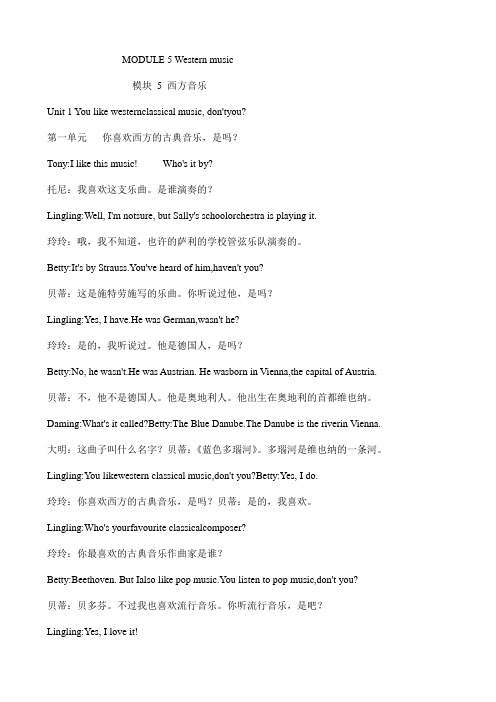
MODULE 5 Western music模块5 西方音乐Unit 1 You like westernclassical music, don'tyou?第一单元你喜欢西方的古典音乐,是吗?Tony:I like this music! Who's it by?托尼:我喜欢这支乐曲。
是谁演奏的?Lingling:Well, I'm notsure, but Sally's schoolorchestra is playing it.玲玲:哦,我不知道,也许的萨利的学校管弦乐队演奏的。
Betty:It's by Strauss.You've heard of him,haven't you?贝蒂:这是施特劳施写的乐曲。
你听说过他,是吗?Lingling:Yes, I have.He was German,wasn't he?玲玲:是的,我听说过。
他是德国人,是吗?Betty:No, he wasn't.He was Austrian. He wasborn in Vienna,the capital of Austria. 贝蒂:不,他不是德国人。
他是奥地利人。
他出生在奥地利的首都维也纳。
Daming:What's it called?Betty:The Blue Danube.The Danube is the riverin Vienna. 大明:这曲子叫什么名字?贝蒂:《蓝色多瑙河》。
多瑙河是维也纳的一条河。
Lingling:You likewestern classical music,don't you?Betty:Yes, I do.玲玲:你喜欢西方的古典音乐,是吗?贝蒂:是的,我喜欢。
Lingling:Who's yourfavourite classicalcomposer?玲玲:你最喜欢的古典音乐作曲家是谁?Betty:Beethoven. But Ialso like pop music.You listen to pop music,don't you?贝蒂:贝多芬。
外研版英语八年级上册M 5 Unit 3 教案

Unit 3 Language in useⅠTeaching modelRevision and applicationⅡTeaching methodFormal and interactive practiceⅢTeaching aims1. Function: Talking about intentions and plans.2. Structure: Infinitive structures (1): infinitives as objects; verbs followed by infinitives.3. Around the world: Theatres4. Task: Acting out a scene from a play.ⅣTeaching aidsTape recorder, OHP, handoutsⅤTeaching StepsStep 1 Revision1. Talk about Lao She’s Teahouse.2. Work in pairs to review the text of Unit 1 and Unit 2Step 2 Language practice1. Read through the example sentences in the box with the whole class.1) I wanted to see the Beijing Opera.2) Lingling offered to take me there.3) We only planned to watch for an hour.4) We decided to stay for three hours.5) I hope to understand more next time.2. Work in pairs.3. 动词不定式词组want to do sth.offer to do sth.decide to do sth.remember to do sth.forget to do sth.stop to do sth.agree to do sth.hope to do sth.like to do sth.Step 3 Grammar动词不定式的用法(1)动词不定式是由“to+动词原形〞构成(有时可以不带to)。
外研版八年级英语上册教案 M5 Unit 3 教学设计
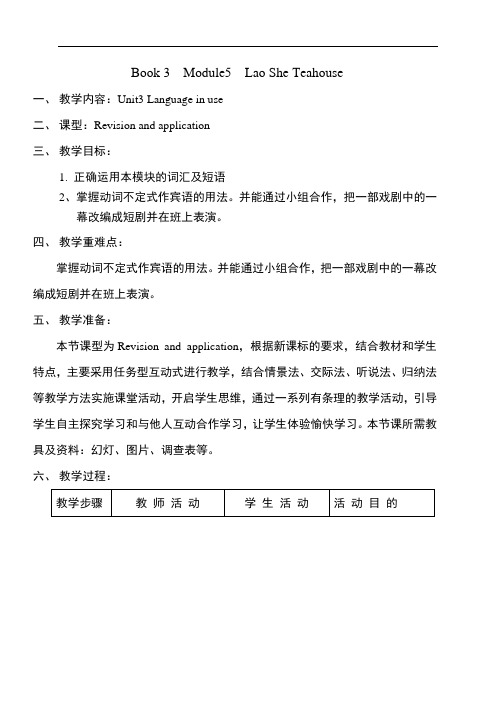
Book 3 Module5 Lao She Teahouse一、教学内容:Unit3 Language in use二、课型:Revision and application三、教学目标:1. 正确运用本模块的词汇及短语2、掌握动词不定式作宾语的用法。
并能通过小组合作,把一部戏剧中的一幕改编成短剧并在班上表演。
四、教学重难点:掌握动词不定式作宾语的用法。
并能通过小组合作,把一部戏剧中的一幕改编成短剧并在班上表演。
五、教学准备:本节课型为Revision and application,根据新课标的要求,结合教材和学生特点,主要采用任务型互动式进行教学,结合情景法、交际法、听说法、归纳法等教学方法实施课堂活动,开启学生思维,通过一系列有条理的教学活动,引导学生自主探究学习和与他人互动合作学习,让学生体验愉快学习。
本节课所需教具及资料:幻灯、图片、调查表等。
六、教学过程:教学步骤教师活动学生活动活动目的1. Leading-i n (8’)1.Show some picturesand ask students todiscuss in pairs andmake sentences likethese:I want to …She offered to ….We planned to ….My mother hopesto….And write someinfinitive sentenceson the blackboard1. Discuss in pairsand make sentenceslike these:I want to ….She offered to ….We planned to ….My mother hopesto….复习和巩固所学的知识点。
2. While-tas k(20’)1. Get the Ss to sumup the sentences onthe blackboard.(动词不定式)2. Let the students doActivity 1, then checkthe answers.1. Try to understandand sum up thesentences on theblackboard.2. Do Activity 1:Complete thesentences with thecorrect form of thewords in the box.复习巩固前面两个单元所掌握的语法和词汇。
2020外研版英语(新标准)八年级上册Module5LaoSheTeahouseUnit3教案

Unit 3 Language in useⅠTeaching modelRevision and applicationⅡTeaching methodFormal and interactive practiceⅢTeaching aims1. Function: Talking about intentions and plans.2. Structure: Infinitive structures (1): infinitives as objects; verbs followed by infinitives.3. Around the world: Theatres4. Task: Acting out a scene from a play.ⅣTeaching aidsTape recorder, OHP, handoutsⅤTeaching StepsStep 1 RevisionTeahouse.1. Talk about Lao She’s2. Work in pairs to review the text of Unit 1 and Unit 2Step 2 Language practice1. Read through the example sentences in the box with the whole class.1) I wanted to see the Beijing Opera.2) Lingling offered to take me there.3) We only planned to watch for an hour.4) We decided to stay for three hours.5) I hope to understand more next time.2. Work in pairs.3. 动词不定式词组want to do sth.offer to do sth.decide to do sth.remember to do sth.forget to do sth.stop to do sth.agree to do sth.hope to do sth.like to do sth.Step 3 Grammar动词不定式的用法(1)动词不定式是由“to+动词原形”构成(有时可以不带to)。
Module+5+Unit+3 外研版八年级英语上册

Betty (1) _w_a_n_t_e_d_ to see the Beijing Opera again. Lingling (2) _o_f_fe_r_e_d__ to take her. Daming (3) __ad__v_is_e_d_ them to go to Mei Lanfang Theatre. Lingling (4) __d_e_c_id_e_d_ to go next Saturday.
2 Read the conversation and complete the note with the correct form of the words in the box.
advise decide offer want
Betty: I’d love to see the Beijing Opera again. Lingling: Would you like me to take you? Where can we go
B.happened
C.take place
D.took place 3.World War Ⅱ
A.take place
BC.happened to C.took place
in 1939. D.happened4.They
spent a lot of time_________the performance.A.practise B.to practise
see spend stay teach write
新 外研版英语八年级上册Module 5 Unit3配套练习(附答案)

[见《基础闯关练》P15] Ⅰ.用括号中所给单词的适当形式填空1.The crowd __cheered__(cheer)when the hot-air balloon rose into the air.2.My mother often makes me __visit__(visit)my grandparents on Sunday.3.The funny story __took__(take)place in class yesterday.4.This __actor's__(actor)clothes are very beautiful in the movie.5.Many fast food restaurants have red __furniture__(furniture)or walls.6.—I'm very tired.What can I do?—How about __listening__(listen)to music?7.—I don't know what to do this week.—Why not __have__(have)a party at home?Ⅱ.根据句意及汉语提示完成单词1.Sam comes from Australia and he hopes to take a class of local __opera__(歌剧).2.The talk show __ended__(结束)at 8:00 pm last night.3.You can look through the passage quickly if you want to get the __main__(主要的)idea. 4.MagicBrush__describes__(描述)a poor boy called Ma Liang.5.The model was __named__(称为)“April” because she was born in April.6.The tea trade from China to western countries took place in the 19th __century__(世纪).7.The whole __society__(社会)has realized the importance of protecting the environment. 8.I think the __actress__(女演员)played Mulan's role well.9.I'm reading a __novel__(小说)written by George Eliot.10.You can find whatever you want in the __magic__(魔法的)box.11.Thanks a lot for inviting me to your __twentieth__(第二十)birthday party.12.This kind of thing happens all the time.It's very __common__(普通的).Ⅲ.用适当的介词填空1.The little girl offered her seat __to__ an old man on the bus.2.Last Sunday my mother made a birthday cake __for__ me.3.Could you pass that pencil __to__ me?4.Boys and girls,now let's give a warm welcome __to__ our new classmate,Lucy! 5.Waiters bring tea __to__ the customers.6.My father bought a computer __for__ me last week.7.Mum, the beautiful card I made last night is just __for__ your fortieth birthday. 8.Linda, if you like the movie,I'll book a ticket __for__ you.9.Please lend your pencil __to__ me.10.I should return the book __to__ Lucy before this Friday.Ⅳ.用方框中所给动词的适当形式填空let;clean;be;say;take1.Remember __to__clean__ your room before you go to play football.2.I want __to__be__ a scientist when I grow up.3.China plans __to__let__ tourists visit the XishaIsland in the South China Sea this year. 4.Jack decided __to__take__ Chinese folk music as a course.5.Don't forget __to__say__ “thanks” when other people help you.Module 3 SportsUnit 1 Nothing is more enjoyable than playing tennis.一、根据句意及首字母或汉语提示完成句子1. I think playing alone is b__________.2. This is an _________ (令人兴奋的) news for me.3. Lucy looks sad, what’s the m________ with her?4. The Smiths will have a ________ (轻松的) holiday.5. I have a_______ finished my work today.6. Each correct answer will _______ (得分) two points.7. There will be a match in this s__________.8. I don’t ________ (介意) if you will be successful.9. Quan Hongchan got a golden medal in Tokyo O_________.10. The boy like _________ (排球) very much.二、用所给词的适当形式填空11. The boy often like listening to ________ (relax) music.12. Nothing is ___________ (exciting) than playing football.13. Tom _______ (hurt) his arm during the sports meeting yesterday.14. Running Man is an __________ (enjoy) programme.15. ________ (read) books is more interesting than watching TV.16. Do you mind my _______ (open) the door?17. Kate has five _________ (volleyball) in her room.18. Playing basketball is more interesting than __________ (play) football.19. They enjoy _________ (read) book after dinner.20. We have lots of time _______ (get) to the airport.三、单项选择( )21. ________ in the river is too dangerous for people.A. SwimmingB. SwimC. To swimD. Swims( )22. Most of students enjoy ________ computer games.A. playingB. playsC. to playD. play( )23. Our country is becoming ___________.A. more beautiful and more beautifulB. beautifuler and beautifulerC. more and more beautifulD. beautiful and beautiful( )24. Basketball is my favourite ________. A. music B. subjectC. foodD. sports( )25. --Sorry, I forget to take your book back. --_______. You can take it here tomorrow.A. I’m sorry to hear that.B. Thank you.C. With pleasure.D. Never mind.( )26. I am _______ about this ______ news.A. exciting; excitingB. exciting; excitedC. excited; excitingD. excited; excited( )27. --- Hi, Tom. _________?--- Her dog is hurt.A. What’s the matter with her?B. How are you?C. What’s Lucy like?D. Who’s that?( )28. I think English is ______ than Chinese.A. more difficultB. difficultC. most difficultD. as difficult( )29. We’ve got ______ fruit in my fridge.A. a littleB. plenty ofC. littleD. few( )30. I don’t like this movie because I think it’s too ______.A. relaxingB. excitingC. interestingD. boring四、翻译句子31. --对不起,让你久等了。
外研社最新版八年级英语上册课文原文(完整版之Module5-Module6)
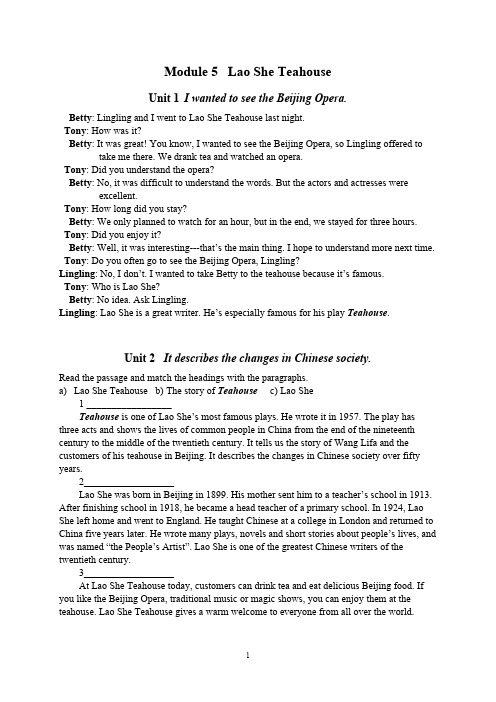
Module 5 Lao She TeahouseUnit 1I wanted to see the Beijing Opera.Betty:Lingling and I went to Lao She Teahouse last night.Tony:How was it?Betty: It was great! You know, I wanted to see the Beijing Opera, so Lingling offered to take me there. We drank tea and watched an opera.Tony: Did you understand the opera?Betty: No, it was difficult to understand the words. But the actors and actresses were excellent.Tony: How long did you stay?Betty: We only planned to watch for an hour, but in the end, we stayed for three hours.Tony: Did you enjoy it?Betty: Well, it was interesting---that’s the main thing. I hope to understand more next time. Tony: Do you often go to see the Beijing Opera, Lingling?Lingling: No, I don’t. I wanted to take Betty to the teahouse because it’s famous.Tony: Who is Lao She?Betty: No idea. Ask Lingling.Lingling: Lao She is a great writer. He’s especially famous for his play Teahouse.Unit 2It describes the changes in Chinese society.Read the passage and match the headings with the paragraphs.a)Lao She Teahouse b) The story of Teahouse c) Lao She1 _________________Teahouse is one of Lao She’s most famous plays. He wrote it in 1957. The play has three acts and shows the lives of common people in China from the end of the nineteenth century to the middle of the twentieth century. It tells us the story of Wang Lifa and the customers of his teahouse in Beijing. It describes the changes in Chinese society over fifty years.2__________________Lao She was born in Beijing in 1899. His mother sent him to a teacher’s school in 1913. After finishing school in 1918, he became a head teacher of a primary school. In 1924, Lao She left home and went to England. He taught Chinese at a college in London and returned to China five years later. He wrote many plays, novels and short stories about people’s lives, and was named “the People’s Artist”. Lao She is one of the greatest Chinese writers of the twentieth century.3__________________At Lao She Teahouse today, customers can drink tea and eat delicious Beijing food. If you like the Beijing Opera, traditional music or magic shows, you can enjoy them at the teahouse. Lao She Teahouse gives a warm welcome to everyone from all over the world.Module 6 Animals in dangerUnit 1It allows people to get closer to them.(Lingling and Betty are leaving the zoo)Lingling: Did you like the zoo?Betty: Yes! I saw the pandas at last! But I am more interested to see the pandas in the Wolong Panda Reserve, because it allows people to get closer to them. Lingling: It’s sad to think of pandas and other animals in danger.Betty: We need to protect them better.Lingling: Yes. Many wild animals don’t have a safe place to live, because villages and farms are growing bigger and are taking away their land and forests.Betty: Also, often there isn’t enough clean water. I think we all need to help animals live in peace. Look, there’s a notice.Lingling: It says, “Help! We want to save animals in danger, and we need your help.”Betty: But what can we do?Lingling: It says, “Your money pays to look after the animals.” That means we can give money to help protect the animals.Betty: Maybe we can raise some money at school. Let’s first find out what else we can do to save as many animals as possible.Unit 2The WWF is working hard to save them all.Read the passage and match the headings with the paragraphs.a)Nature parks for pandas c) The panda’s homeb)WWF and animals in danger d) An animal in danger1 _________________Pandas are in danger. There are only about 1,600 pandas in the wild today. Zoos and research centres are looking after about 340 pandas. Pandas do not have many babies, and baby pandas often die. The situation is getting very difficult. Scientists are doing a lot of research to help pandas produce more babies and help baby pandas live.2_________________Pandas live in the forests and mountains of Southwest China. Each panda needs to eat a lot of bamboo every day. The bamboo forests are getting smaller, so pandas are losing their home.3_________________In order to protect pandas in the wild, the government is setting up nature parks and developing other plans. The nature parks will be big and there will be more bamboo to feed the pandas. Pandas born in zoos may go back to live in the nature parks.4_________________The world Wide Fund for Nature (WWF) wants to protect all animals. And it chose the panda to be its symbol. We do not want to lose tigers, elephants or any other animals, so the WWF is working hard to save them all.。
外研版八年级英语上册全部课文及翻译
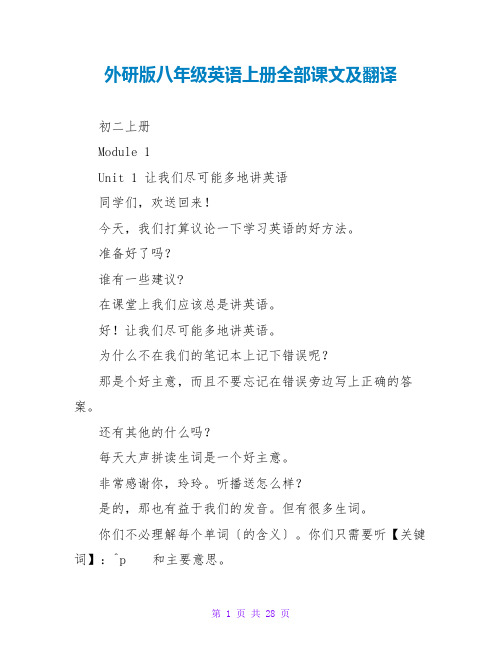
外研版八年级英语上册全部课文及翻译初二上册Module 1Unit 1 让我们尽可能多地讲英语同学们,欢送回来!今天,我们打算议论一下学习英语的好方法。
准备好了吗?谁有一些建议?在课堂上我们应该总是讲英语。
好!让我们尽可能多地讲英语。
为什么不在我们的笔记本上记下错误呢?那是个好主意,而且不要忘记在错误旁边写上正确的答案。
还有其他的什么吗?每天大声拼读生词是一个好主意。
非常感谢你,玲玲。
听播送怎么样?是的,那也有益于我们的发音。
但有很多生词。
你们不必理解每个单词〔的含义〕。
你们只需要听【关键词】:^p 和主要意思。
阅读也一样。
英语故事如此有趣。
通过阅读我逐渐理解了世界上的许多事情。
我认为写作也很重要。
我们为什么不尽量去找些讲英语的笔友呢?我们可以给他们写信。
太棒了!我同意你〔的提议〕。
Unit 2 你应该向她微笑!很多学生咨询如何进步他们英语程度的建议。
这儿是三个根本问题。
第一个问题是关于理解英文电影和歌曲的问题。
来自湖北的李浩写道:“我喜欢看英文电影,听英文歌曲,但我只能理解一点儿。
我可以怎么做呢?”看电影和听歌曲是学习英语的很好的方式!看上或听上几遍,并猜想生词的含义。
每一遍你都会学到新东西。
我还建议你和朋友们议论一下这些电影或歌曲。
第二个问题是关于说的。
来自吉林的王帆写道:“我们学校有一位来自美国的教师。
我很腼腆,不敢与她说话。
我该怎么办呢?”你可以说:“嗨!你好吗?”“你喜欢中国吗?”这些都是展开交谈的好方式。
在你开场〔讲英语〕前,你应该向她微笑!记住这一点:不要害羞,去试一试。
第三个问题是关于词汇的。
来自安徽的张雷写道:“我写下生词,但我很快就忘记了它们。
我怎样才能记住它们呢?”不用担忧,忘记生词是很自然的!我建议你每天把4个或5个单词写在纸片上并放在你的房间里。
看到这些单词的时候就读一读,并且尽量使用它们。
Module 2 我的家乡和我的国家Unit 1 它比许多其他建筑物都高。
嘿,大明!你的周末过得怎么样?很好!我去深圳了。
八年级英语上册外研社版基础读写Module3

Unit 1Nothing is more enjoyable than playing tennis.听,并跟读下列单词1.baseball n. 棒球2.volleyball n. 排球3.boring adj. 烦人的;无聊的4.exciting adj. 令人激动的;使人兴奋的5.relaxing adj. 令人愉悦的;使人放松的6.sore v. (体育比赛中)得(分)7.already adv. 已经;早已8.hurt v. (使)疼痛;(使)受伤9.enjoyable adj. 令人愉快的;有乐趣的10.Olympics n. 奥林匹克运动会11.stadium n. 体育场12.miss v. 未击中;未达到13.mind v. 介意;讨厌;反对14.matter n. 问题;麻烦听,并跟读下列短语1.the football match 足球比赛2.not…at all 一点也不,完全不3.sit down 坐下4.watch the match 观看比赛5.be sure 相信,确定6.play tennis 打网球7.buy tickets 买票8.stay at home 待在家里9.go to the stadium 去体育馆10.look at 朝……看11.bad luck 坏运气12.never mind 没关系13.plenty of 大量;众多14.enjoy doing sth. 喜欢做某事听,并跟读下列句子1.What's the score? 比分是多少?st week the match on TV was so boring because no one scored at all. 上周电视上的比赛太无聊了,因为根本没有一个队进球。
3.What's the matter with you, Tony?托尼,你怎么了?4.Nothing is more enjoyable than playing tennis.没有什么比打网球更令人愉快了。
- 1、下载文档前请自行甄别文档内容的完整性,平台不提供额外的编辑、内容补充、找答案等附加服务。
- 2、"仅部分预览"的文档,不可在线预览部分如存在完整性等问题,可反馈申请退款(可完整预览的文档不适用该条件!)。
- 3、如文档侵犯您的权益,请联系客服反馈,我们会尽快为您处理(人工客服工作时间:9:00-18:30)。
【即学活用】
①你什么时候把自行车还给我?
return my bike __ to me给我。 give the dictionary __ to me. Please ____
③昨天我妈妈给我们做了面条。 cooked _______ noodles ___ for us. Yesterday my mother _______ ④大明把他的自行车借给了我。 lent ___ me his bike. Daming ____ ⑤老师给我们讲了一个有趣的故事。 told __ us an interesting story. The teacher ____
Module 5
Lao She Teahouse
Unit 3
一、动词不定式(一)
【新知导引】
用所给词的适当形式填空。
to see ①I wanted _____(see)the Beijing Opera, so Lingling
to take offered ______(take)me there.
gives a warm welcome __ to ②Lao She Teahouse _____
everyone from all over the world.
→Lao She Teahouse gives everyone from all over the world a warm welcome.
Northern Liang北凉
Northern Wei北魏
★审题谋篇
(1)时态: 主要使用一般过去时
(2)人称: 使用第三人称和第一人称 (3)模板:
★妙笔成篇
My favourite TV play is The Princess Weiyang.
This is a story about a princess called Xiner in Northern Liang. The story took place over 1, 600 years ago. She had to go to Northern Wei because of the war. And she became Li Weiyang, who saved her. Then she
4. 写作过程中, 还要注意表示时间的词汇的使用, 使剧
情有跨度。
Ⅱ. 写此类文章时的主要句式:
1. My favourite film is Love Me Once Again, Mum.
我最喜欢的电影是《妈妈再爱我一次》。 2. This film is about a mother and a son. 这部电影是关于一个妈妈和一个儿子的。
fell in love with Tuoba Jun, and helped him become a
king. So in the end, she became a good queen.
Everyone says it is one of the most interesting TV plays
【知识详解】动词不定式作宾语
1. 含义: 动词不定式是一种非谓语动词形式, 它没有人
称和数的变化, 在句中不能独立作谓语, 但可以在句中 作宾语、宾语补足语、状语、定语、主语、表语等。 2. 构成: to+动词原形
3. 常见的可以跟动词不定式作宾语的词有:
plan(计划), decide, hope, want, agree(同意), offer(提
【知识详解】双宾语
1. 定义: 有些及物动词后可接两个宾语, 一个指人, 叫
间接宾语, 另一个指事物, 叫直接宾语, 这种“动词+人 +事物”的结构称为双宾语结构。
2. 双宾语的两种形式:
(1)动词+间接宾语(某人)+直接宾语(某物)
(2)动词+直接宾语(某物)+ to/for +间接宾语(某人)
3. The story took place many years ago.
故事发生在很多年以前。
4. 18 years later, the son found his mother. 18年以后, 这位儿子找到了他的妈妈。 5. In the end, the mother got to know her son. 最后, 这位妈妈认出了儿子。
以“My favourite TV play”为题目, 向大家介绍
你最喜欢的一部电视剧《锦绣未央》(The Princess Weiyang)。
要求: 80个词左右。
提示: 1. 她本是北凉国一个幸福的公主;
2. 到了北魏, 成为李未央; 3. 帮助拓跋浚成为皇帝; 4. 成为一个王后。 参考词汇: princess公主 king国王 queen王后
to travel ③Mr Green is planning ________(travel)to Beijing
next week.
to answer ④Could you tell me how _________(answer)the question? to help ⑤Today the company offers ______(help)the poor family.
★短语积累
1. 发生
take place _________
2. 最后
send sb. to. . . ____________ be born _______ 6. 回到
in the end _________
3. 把某人送到„„ 4. 出生 one of. . . 5. „„之一 ________
return to ________
make sb. do sth. 7. 使某人做某事 ______________ tell sb. sth. 8. 告诉某人某事 __________
★句子积累
1. 我最喜欢的戏剧是老舍的《茶馆》。
favourite ____ play is Teahouse by Lao She. My ________ 2. 他是中国最著名的作家之一。 one __ of the _____ most _______ famous _______ writers in China. He is ____ 3. 我的家乡发生了许多变化。 took _____ place in my home town. Many changes ____
4. 琳达把她的猫送到了她朋友的家。 sent her cat __ to her friend’s home. Linda ____ 5. 最后, 我们打败了他们赢得了比赛。 In ___ the ____, end we beat them and won the match. __
【实战演练】
供), try, like, love, promise等。
【即学活用】
用所给动词的适当形式填空。
to buy ①Mum, I decide ______(buy)a new bag. Do you agree with me? to be ②Some of the young girls hope _____(be)famous someday.
【话题剖析】 本模块的话题是戏剧和电影。在写这类作文时, 首 先要对人物或故事内容进行梳理。对事情发生的时间、
地点、涉及的人物和经过要进行描述。注意写作时, 要
注意时态和人称的运用。
【素材积累】
★词汇积累
1. 提议; 提出 3. 给„„命名 5. 结束 offer _____ name _____ end ____ 2. 描述 4. 展示 6. 第二十 describe ________ show _____ twentieth _________
in China.
【方法技巧】
本模块的话题是“戏剧和电影”。在这一模块中,
我们学习了老舍、老舍的《茶馆》以及老舍茶馆的简 介。运用所学知识, 写一篇短文介绍一部戏剧或电影是 本模块的写作任务。
Ⅰ. 写此类文章时的注意事项:
1. 开篇提出自己最喜欢的电影或戏剧, 并描述其主要内
容。 2. 详细介绍故事发生的时间、地点、涉及的人物以及 故事发展的过程和结局。 3. 最后对电影或戏剧作出整体评价。
to watch ②We only planned ________(watch)for an hour. to understand ③I hope ____________(understand)more next time. to take ④I wanted ______(take)Betty to the teahouse because it’s famous.
3. 常用词: 可以接双宾语的动词很多, 常见的有:
(1)常见可以用介词to进行转换的动词有: bring, teach,
lend, send, give, tell, sell, pass, show, offer等。 (2)常见可以用介词for进行转换的动词有: buy, get, make, cook, read等。
二、双宾语
【新知导引】
把下列句子改为同义句。 ①It tells us the story of Wang Lifa and the customers of his teahouse in Beijing. tells the story of Wang Lifa and the customers of →It ____ to us. his teahouse in Beijing __
